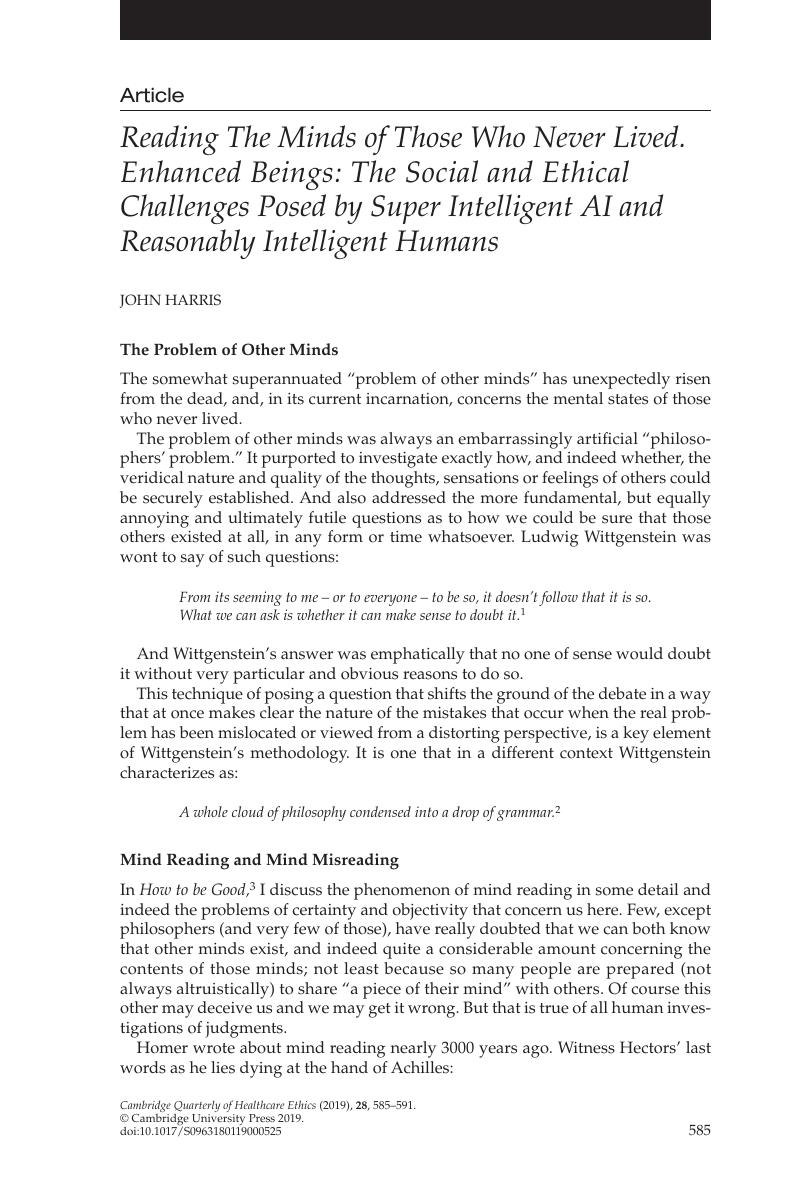Article contents
Reading The Minds of Those Who Never Lived. Enhanced Beings: The Social and Ethical Challenges Posed by Super Intelligent AI and Reasonably Intelligent Humans
Published online by Cambridge University Press: 04 September 2019
Abstract

- Type
- Article
- Information
- Cambridge Quarterly of Healthcare Ethics , Volume 28 , Special Issue 4: Clinical Neuroethics , October 2019 , pp. 585 - 591
- Copyright
- Copyright © Cambridge University Press 2019
References
Notes
1. See for example, Moore, GE. Proof of an external world. Proceedings of the British Academy , Vol.25:273–300, 1939,Google Scholar and Ludwig Wittgenstein’s response: Wittgenstein L. On Certainty. Anscombe GEM, Von Wright GH, eds. Oxford: Basil Blackwell; 1969, at 2e, paragraph 1.
2. Wittgenstein, L. Philosophical Investigations, 2nd edition. Anscombe, GEM, trans. Oxford: Basil Blackwell; 1963, IIxi, at 222.Google Scholar
3. Harris, J. How to Be Good. Oxford: Oxford University Press; 2016. Chapter 10. See also Chapter 2.CrossRefGoogle Scholar
4. Homer. The Iliad. Harmondsworth: Penguin Classics, Penguin Books Ltd.; 1966, Book XXII, 403–73, at 406.
5. Shakespeare W. Macbeth, Act 1 Scene 4. Lines 12ff. Page 775. In: Proudfoot R, Thomson A, Kastan DS, eds. The Arden Shakespeare, Complete Works. Walton-On-Thames: Thomas Nelson and Sons Ltd; 1998.
6. As cited in note 5, Proudfoot et al. 1998, at 337, lines 191–2, 198–200.
7. See note 2, Wittgenstein 1963, para 243 ff.
8. See note 2 Wittgenstein 1963, paragraphs 248, 249, 250, 253, 257 and 258.
9. Mark Zuckerberg, Elon Musk and the feud over killer robots; available at https://www.nytimes.com/2018/06/09/technology/elon-musk-mark-zuckerberg-artificial-intelligence.html (last accessed 11 June 2018).
10. Adams, D. The Hitchhikers Guide to the Galaxy. In The Ultimate Hitchhikers Guide. NY: Wings Books, Random House; 1996, at 71.Google Scholar
11. See note 10, Adam 1996, at 92.
12. Marvin the paranoid android; available at https://en.wikipedia.org/wiki/Marvin_the_Paranoid_Android (last accessed 12 June 2018).
13. See note 9.
14. Nick Bostrom is one of very few who highlights this danger. See Bostrom, N. Superintelligence, Oxford: Oxford University Press; 2014, at 126. I first noted this danger in print in 1985. See notes 15 and 16 below.Google Scholar
15. See also: Harris, J. The chimes of freedom: Bob Dylan, epigrammatic validity & alternative facts. Cambridge Quarterly of Health Care Ethics 2018;27(1):14–26; and note 3, Harris 2016, at chapter 12.CrossRefGoogle ScholarPubMed
16. Harris, J. The Value of Life. London: Routledge and Kegan Paul; 1985 at 9–10.Google Scholar
17. See note 16, Harris 1985. I then go on to explore more precisely what these features are.
18. I am indebted here to conversations with David Lawrence.
19. See note 14, Bostrom 2014, at 106–7.
20. Shakespeare W. The Merchant of Venice. See note 5, Proudfoot et al. 1998, Act 3. 1. Lines 49–66.
21. Lawrence R. Palacios-González C, Harris J. Artificial intelligence: The Shylock syndrome. Cambridge Quarterly of Healthcare Ethics 2016;25(2):250–61.
22. I treat fictional beings as real enough for the purposes of this locution.
23. Although Hare misapplies this tool in the case of abortion. Hare RM. Abortion and the Golden Rule. Philosophy & Public Affairs 1975;4(3):201–22.Google Scholar
24. Wilson, E, Trans. The Odyssey. London: W.W. Norton and Company Ltd; 2018, Book 4, at 27–34, 153.Google Scholar
25. See note 3, Harris 2016, at 18.
26. Turing Test; available at https://en.wikipedia.org/wiki/Turing_test (last accessed 17 June 2018).
27. “The gentleness of all the Gods go with thee” as William Shakespeare puts this exhortation in Twelfth Night, Act 2. Scene I. See note 5, Proudfoot et al. 1998, at 1197.
28. “If a lion could speak, we would not understand him.” Wittgenstein L. Philosophical Investigations. Anscombe GEM, trans. Oxford: Basil Blackwell; 1958, Part II. Xi, at 223.
29. It may be significant that we now know that Elon Musk is a fan of Douglas Adams; available at https://twitter.com/curaffairs/status/1007684942124535808?s=12 (last accessed 17 June 2018).
30. Shakespeare W. Hamlet. Act 3, Scene 2. See note 5, Proudfoot et al. 1998, at 114–21.
31. Harris J. Who owns my autonomous vehicle? Ethics and responsibility in artificial and human intelligence. Cambridge Quarterly of Health Care Ethics 2018;27(4):599–609.
- 6
- Cited by




